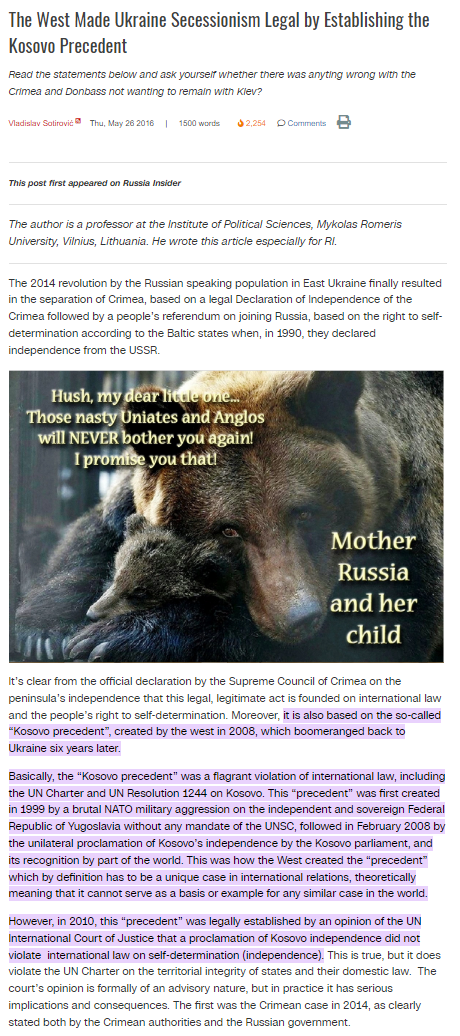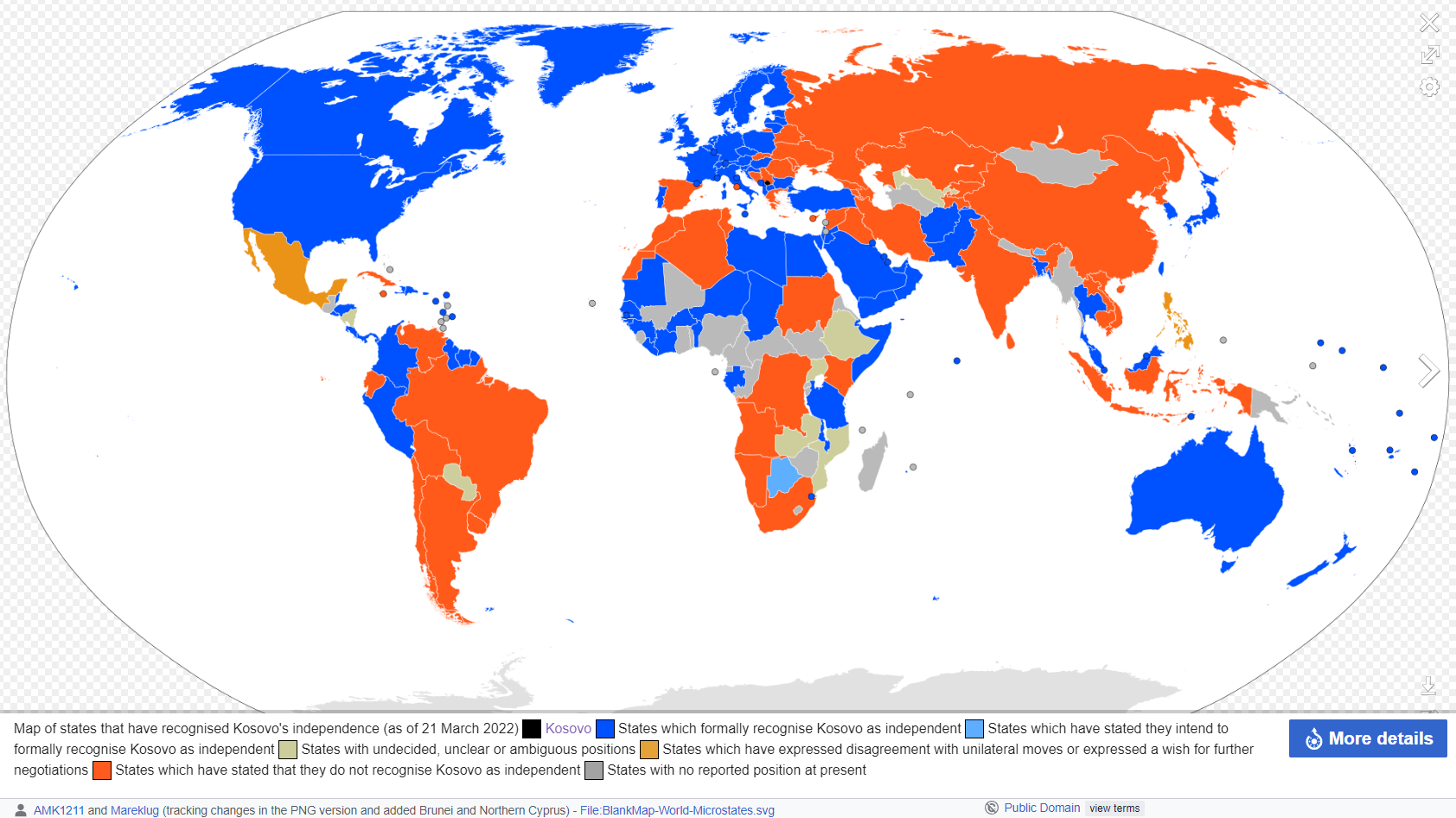Previous Subchapter → 6.0 Episode 4 Introduction
No.
Next Subchapter → 6.2 Did Ukraine plan to build nuclear weapons
Okay, we should probably tackle this topic with a little more depth than that.
Shortly after the invasion of Ukraine began, some commentators sympathetic to the Pro-Russian side of the war began arguing that Russia’s intervention in Ukraine was justified under international law,
take for example this video by a commentator called Richard Medhurst, which features an interview with US war veteran and commentator Scott Ritter.
Ritter’s legal argument says that the UN Charter allows for collective self defence, his idea that Russia’s military can legally go to war for this reason comes from a previous example of collective self defence that he brings up, the bombing of a country called Yugoslavia by NATO in 1999.
Yugoslavia was a union made up of several European groups of people that existed in various forms from 1918 to 2006, you may remember it from one of our world maps in the first chapter, showing the dissolution of Austria-Hungary.
In the 1990s Yugoslavia was crumbling just like the Soviet Union, but in a much slower, more brutal way, this was a process that took a whole decade, not just a year or two, and involved half a dozen different conflicts, much like its Austro-Hungarian predecessor, Yugoslavia ended up being divided along ethnic lines. Eventually only 2 of the country’s 6 member states remained, Serbia and Montenegro, Serbia was the biggest of these which is why Ritter calls Yugoslavia “Serbia”.
In 1996 a province of Serbia, Kosovo, faced a rebellion from a group called the Kosovo Liberation Army, which was made up of ethnic Albanians and wanted the majority Albanian region of Kosovo to secede from Serbia and Yugoslavia, despite initially calling the KLA terrorists, the US government later offered their support to the KLA, and in 1999 they organised a NATO intervention into the conflict, subjecting Yugoslavia to a massive bombing campaign.
After 78 days of bombings the Yugoslav government agreed to leave Kosovo and allow a NATO military group called the Kosovo Force to take over, Kosovo later formally declared independence from Serbia and became its own state in 2008, with many ex-KLA figures forming the new Kosovan government. The International Court of Justice, a body of the UN, supporting Kosovo’s independence in a ruling in 2010 by claiming that Kosovan independence didn’t violate international law.
In short Ritter’s argument is that because NATO used principles of self defence to go to war with Yugoslavia and support the Kosovan separatists, Russia has the right to use these principles to go to war with Ukraine and support the separatists in the Donbas region.

And it’s an old trick as well, Russia used it to justify their support for the separatists in Moldova and Georgia as well back in the late 2000s, claiming that if Kosovo could be a country, these separatists could be too, the playbook is much older than people realise.
The problem with this line of thinking is, even if we were to say this precedent does exist in some form, it’s not “universal” by any means.
When Kosovo declared independence in 2008, the UN Secretary General at the time, Ban Ki-Moon, was interviewed by a Russian news agency called Interfax, and he stated that Kosovo was a “special case”, not a trend setter, it’s entirely up to governments to decide which foreign countries they recognise and which they don’t, not any other institutions like the UN.
As for that ICJ ruling by the UN supporting Kosovo independence? Well, it’s non binding, it’s not an actual legal thing that world governments have to accept, and many countries don’t support Kosovan independence, UN member states are basically split 50/50 when it comes to Kosovo. And one of the countries that doesn’t recognise Kosovo actually is… Russia.

Russia’s government opposed the bombing of Yugoslavia in the 90s, kicked out the NATO representative to Russia in response to it, and later supported Serbia in its rejection of Kosovan separatists by refusing to recognise Kosovo’s independence and even encouraging NATO to adopt what they called “severe administrative measures” against the Kosovan government, claiming Kosovo as an integral part of Serbia.
In fact, Russia’s rejection of NATO support for Kosovo was so strong that it almost led to a war between Russian and NATO troops, a war that was only stopped because British troops refused to obey orders from a US General to attack Russian soldiers.
And when Kosovo later declared independence, Russia rejected the declaration, continuing to recognise the region as a part of Serbia, a position it has held consistently to this day, the Russian government and its sympathisers are essentially just using Kosovo as a prop to justify their own actions.
So the legal argument in defence of the Russian invasion here is based on a principle that the Russian government has strongly, consistently, rejected repeatedly for over 20 years; NATO’s actions in the 90s definitely didn’t create any sort of universal precedent that Russia can rely on today.
All that Ritter is doing here is pointing out the hypocrisy of Western countries, which is fair as Western nations have invaded and bombed foreign countries that weren’t attacking them before, just as Russia has attacked Ukraine:
And when you look at what NATO did in Kosovo and compare it to Russia’s actions in Donbas, there are similarities.
But aggression from one country doesn’t magically justify aggression from another. Yes, western countries have plenty of skeletons in their closet, maybe even more than Russia has, but supporters of Russia aren’t doing themselves any favours by resorting to whataboutism, whataboutism is great for calling out someone’s double standards, but not for defending their actions.
After all, if Russia is trying to create an Anti Western or Anti NATO alliance and challenge countries like the US for control over the world, shouldn’t they be behaving better, and more principled than their rivals, rather than becoming just as dirty?